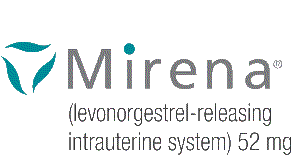Please select below what you have been prescribed Mirena for:
What is HMB?
Menstrual bleeding is considered heavy when it interferes with your physical, social and/or emotional quality of life. Changing sanitary wear more than once every 2 hours, or the need for double protection, are also signs of HMB.
Mirena for HMB
Mirena prevents thickening of the lining of the womb, which reduces blood loss during menstruation when the lining of the womb is shed. Mirena is an effective treatment for HMB and should result in lighter bleeding after 3-6 months of use. Mirena treats HMB for 5 years, but if symptoms do not return after 5 years of use, Mirena can be considered for continued use for up to 8 years. You can also have it removed sooner if you wish.
Explore more
PP-MIR-GB-0187 January 2024
INDICATION FOR MIRENA
Mirena® (levonorgestrel-releasing intrauterine system) is a hormone-releasing IUS that helps prevent pregnancy for up to 8 years. Mirena also treats heavy periods for up to 5 years in women. If symptoms do not return after five years of use, Mirena can be considered for continued use for up to eight years. Mirena provides endometrial protection for up to 4 years.
IMPORTANT SAFETY INFORMATION
- If you have a pelvic or genital infection, get infections easily, or have certain cancers, don't use Mirena. Less than 1% of users get a serious pelvic infection called pelvic inflammatory disease (PID).
- If you have persistent pelvic or stomach pain, or excessive bleeding after placement, tell your healthcare provider (HCP). If Mirena comes out, call your HCP and avoid intercourse or use non-hormonal back-up birth control (such as condoms or spermicide). Mirena may go into or through the wall of the uterus and cause other problems.
- Pregnancy while using Mirena is uncommon but can be life threatening and may result in loss of pregnancy or fertility.
- Ovarian cysts may occur but usually disappear.
- Bleeding and spotting may increase in the first 3 to 6 months and remain irregular. Periods over time usually become shorter, lighter, or may stop.
Mirena does not protect against HIV or STIs.
Only you and your HCP can decide if Mirena is right for you. Mirena is available by prescription only.
For important risk and usage information about Mirena, please see Full Patient Information Leaflet
Reporting adverse events and quality complaints
If you get any side effects talk to your doctor, pharmacist, nurse or other healthcare professional. This includes any possible side effects not listed in this leaflet. You can also report side effects directly via the Yellow Card Scheme at: https://yellowcard.mhra.gov.uk or search for MHRA Yellow Card in the Google Play or Apple App Store. By reporting side effects you can help provide more information on the safety of this medicine. Please report information of when Mirena was inserted and removed, as applicable.





